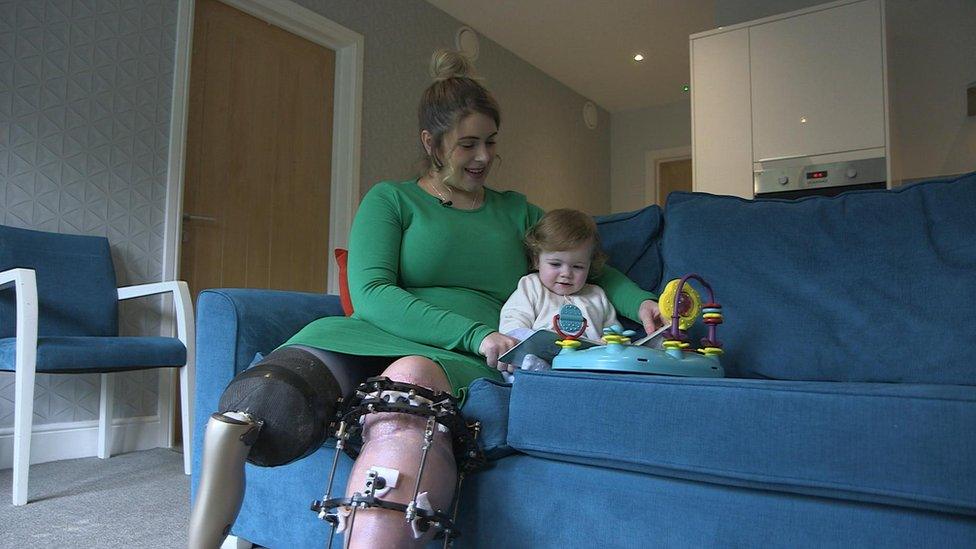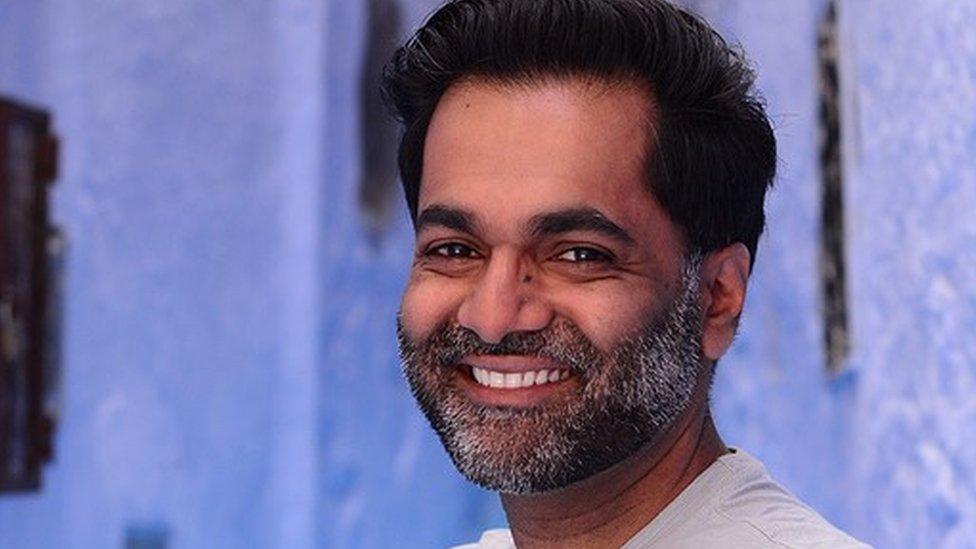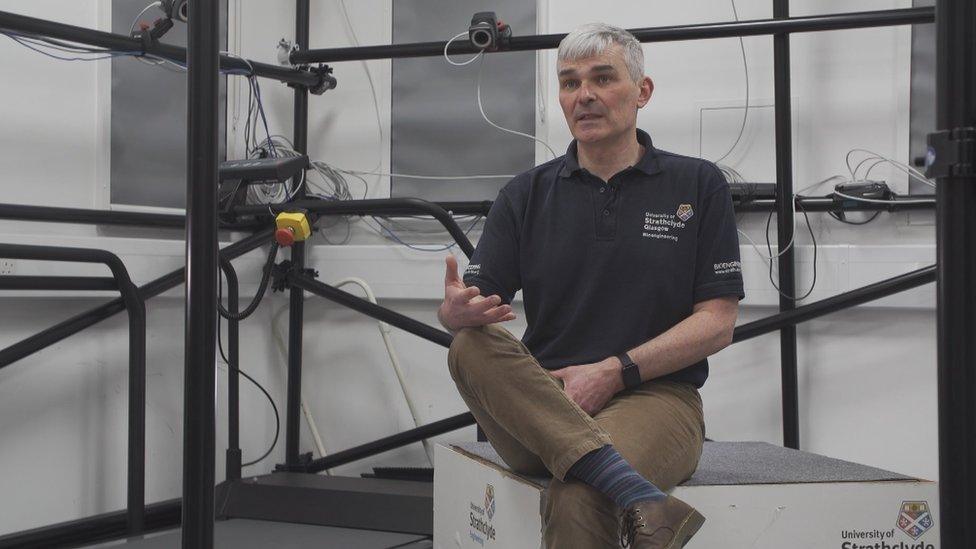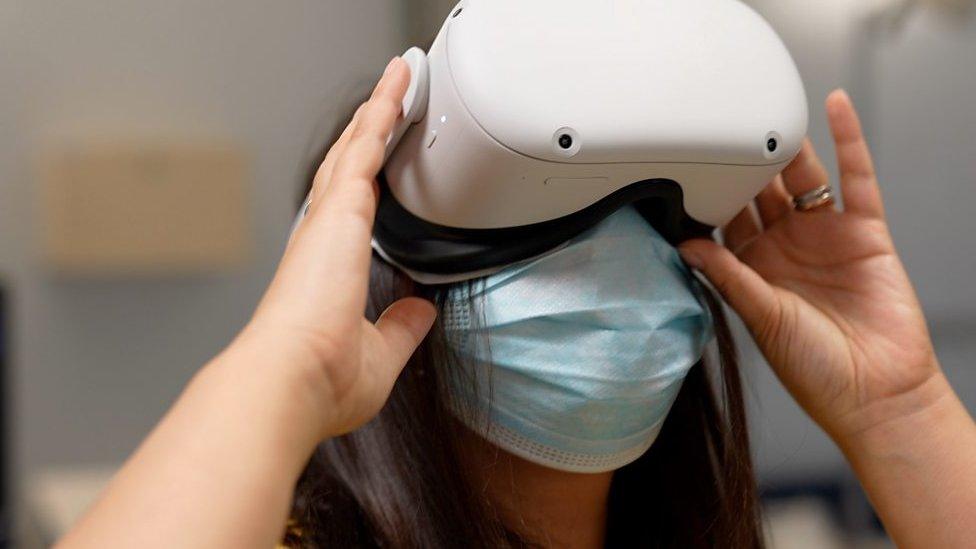Medical gaming treating life-changing injuries
- Published

Ruby and Leon have use of a live-in apartment at Steps rehabilitation clinic
Rehabilitation centres across the world are using computer games to help patients dealing with the impact of serious illness or injury.
Ruby Flanagan, a nurse from the Wirral, lost her leg at the age of 24 after being hit by a car in August 2021.
She is now receiving therapies based on computer games as part of her rehabilitation, which she hopes will mean she will one day be able to lift her young son off the floor.
Ruby suffered her injury while shopping with her five-month-old son, Leon.
Although she managed to throw her son out of harm's way, Ruby was not so lucky.
Her right leg had to be amputated, her left leg needed extensive reconstruction and her pelvis was shattered by the impact of the crash.
"The first few weeks in hospital are a blur," Ruby told BBC Click.
"I don't remember waking up. I don't remember who told me I had my leg amputated. In my head, I thought I'll learn how to walk again. I'll get a fake leg, a prosthetic leg, and that will be that.
"I didn't realise how hard it was actually going to be."

Ruby says her progress is helped by the ambient lighting and calming nature of MindPod's environment
Now at a specialist rehabilitation clinic, called Steps, in Sheffield, Ruby is receiving a variety of conventional treatments, including hydrotherapy and physiotherapy, as well as regular MindPod sessions.
MindPod allows Ruby and other patients with similar conditions to control an animated dolphin to help their bodies regain strength, balance and co-ordination.
"When I first came to Steps, I never imagined intense rehab to be games," she laughs.
She says the ambient lighting and calming nature of MindPod's environment is helping her move her body instinctively, without thinking about it.
Life-changing injuries are being investigated through neuro-animation therapies.
"[MindPod is] helping balance, co-ordination and core stability," she says.
"It reflects on things like if I were in the kitchen, reaching for things up in the cupboards or down below."
Ruby is making excellent progress thanks to her hard work and the support of staff at the clinic.

Lucy Moore says patients using MindPod have found it relaxing
"A lot of feedback that we've had from clients is they feel they've worked within the MindPod but they also feel relaxed when they come out of there, which is really important," explains Steps head of therapies Lucy Moore.
The immersive video-game-inspired therapy has been developed by Dr Omar Ahmad and Dr John Krakauer, of the Kata studio at Johns Hopkins University, in the US.
It uses motion-sensors and cameras to track patients' movements as they direct a playful dolphin called Bandit across a screen.

Dr Omar Ahmad says that unlike with animations, movement in the game is generated in real time
But Dr Ahmad, who invented Bandit, says it's not an animation in the traditional sense.
"All the movement in the game is generated in real time," he explains. The patient ultimately "becomes the dolphin by mastering its motor-dynamics and expressing movement within the animal's space".
His colleague, Dr Krakauer, who is a professor of neurology and neuroscience, describes the novel approach as a "digital therapeutic", meaning a doctor could effectively prescribe software "as [a] pill".
"It creates a feedback loop of learning and enables exploration in the way a child learns to move their arms in early infancy," he says.
Some of the many digital therapies available are being put to the test at Strathclyde University.
Dr Andrew Kerr runs its community-focused Sir Jules Thorn Centre for Co-creation of Rehabilitation Technology, which offers people who've had a stroke the chance to test and develop robotic and gaming-type equipment for their injuries.

Robotic rehabilitation equipment can be tested by patients at a unit at Strathclyde University run by Dr Andrew Kerr
"Ultimately, what we are trying to do here is create technologies that are not just for people who can afford it, but they can have it in their local leisure centres or home," he explains.
The centre's mission is to make rehabilitation technology more widely accessible.
An example of this is the university's 3D motion-capture system, where cameras and sensors are placed all around the room to track the movements of patients.

Student Maisie Keogh helps patients like Craig Kelly, who suffered a stroke, to progress using a 3D motion-capture system
Maisie Keogh, a PhD student in biomedical engineering at the university, works with stroke survivors to produce personalised rehabilitation programmes, guided by a computer to make sure they get the best of out of their therapy.
As with many ground-breaking technologies, it could be months or years before they're widely available in the community.
But for new mum Ruby, whose hard work has already produced excellent progress, there is one particular skill she's focused on mastering.
"My long-term goal is being able to pick up the baby and carry him up and down the stairs," she says.
Find out more about MindPod and digital therapies in the latest episode of BBC Click
- Published8 April 2022

- Published6 December 2019